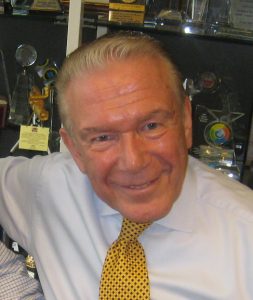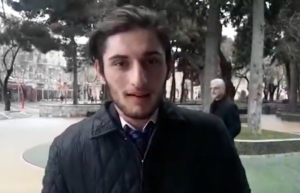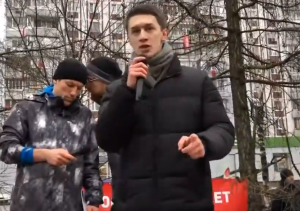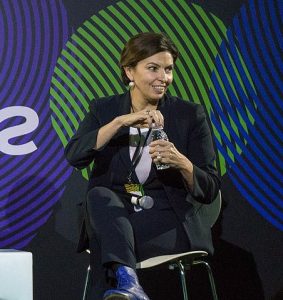21 Oct 2019 | Turkey, Turkey Incident Reports
[vc_row][vc_column][vc_column_text]
Index on Censorship’s Monitoring and Advocating for Media Freedom project tracks press freedom violations in five countries: Azerbaijan, Belarus, Russia, Turkey and Ukraine. Learn more.
[/vc_column_text][/vc_column][/vc_row][vc_row][vc_column][vc_custom_heading text=”9 Incidents” use_theme_fonts=”yes”][vc_column_text]
Evrensel Daily faces a fine of 200,000 Turkish lira

Evrensel Daily is being sued for 200,000 Turkish lira worth of compensation
27 September 2019 – Evrensel Daily has been sued for compensation by Serhat Albayrak, the head of one of Turkey’s largest media groups and the brother of Treasury and Finance Minister Berat Albayrak, who is also President Recep Tayyip Erdoğan’s son-in-law.
Serhat Albayrak is seeking 200,000 Turkish lira (nearly £27,000) in non-pecuniary damages over an article published in the newspaper on 7 April 2019. The article, “AKP’ye kim oy kaybettirdi?” (“Who is responsible for the slide in AKP’s vote?”), is alleged to have been written by Ceren Sözeri, a respected academic and media ethics lecturer.
The trial is due to begin on 4 March 2020 at the Istanbul Commercial Court of First Instance.
Link(s):
https://www.evrensel.net/haber/387636/serhat-albayrak-evrensele-200-bin-tllik-tazminat-davasi-acti
http://bianet.org/english/media/213595-serhat-albayrak-sues-daily-evrensel-demands-200-thousand-liras-for-damages
https://t24.com.tr/haber/serhat-albayrak-tan-evrensel-gazetesine-200-bin-liralik-tazminat-davasi,841094
Categories: Criminal Charges / Fines / Sentences
Source of violation: Court / Judicial
Two former Samanyolu TV staff members arrested
17 September 2019 – Two former producers for the closed down TV station Samanyolu were arrested in Ankara, Anadolu Agency reported. An arrest warrant has been issued for a third former producer.
The warrants for their arrest were issued as part of an ongoing criminal investigation launched by the Ankara Chief Public Prosecutor’s Office against former employees of Samanyolu TV’s Ankara bureau on alleged links to “FETÖ/PDY” (Fethullahist Terrorist Organization/Parallel State Structure).
Link(s):
https://www.aa.com.tr/tr/turkiye/samanyolu-tvnin-eski-calisanlarina-feto-operasyonu/1586937
https://www.cnnturk.com/turkiye/samanyolu-tvnin-eski-calisanlarina-feto-operasyonu
https://www.medyaradar.com/samanyolu-tvnin-eski-calisanlarina-operasyon-haberi-2014162
Categories: Arrest / Detention / Interrogation
Source of violation: Police / State security
Local chair of Journalist Association in Rize attacked
17 September 2019 – Gençağa Karafazlı, the local chairperson of Turkey’s Contemporary Journalists Association’s (ÇGD) branch in the Black Sea city of Rize, Evrensel reported.
Karafazlı was in a café in Rize when he was shot in the leg. The assailant dropped his gun and fled the scene in a taxi. Karafazlı subsequently was hospitalized.
Link(s):
https://www.evrensel.net/haber/387044/gazeteci-gencaga-karafazli-silahli-saldiriya-ugradi
http://gazetekarinca.com/2019/09/rizede-gazeteci-gencaga-karafazliya-silahli-saldiri/
https://www.haberturk.com/rize-haberleri/71914813-rizede-gazeteciye-silahli-saldiri
Categories: Physical Assault / Injury
Source of violation: Unknown
Former Taraf reporter Hüseyin Özkaya sentenced to 7 years in prison
17 September 2019 – Hüseyin Özkaya, a former reporter for the closed-down newspaper Taraf, was convicted of “membership in a terrorist organization”, Anadolu Agency reported. Özkaya was sentenced to 7 years and 6 months in prison by the 16th High Criminal Court of Ankara.
The indictment alleged that Özkaya used the encrypted messaging service ByLock, which Turkish authorities consider to be the primary communication tool between members of the Gülen movement. He was also accused of having deposited cash in Bank Asya, a bank considered to be run by the Gülen movement and where holding a deposit account has been widely used as evidence for the charge of membership in a terrorist organization.
Link(s):
https://www.evrensel.net/haber/387019/taraf-gazetesi-muhabiri-huseyin-ozkayaya-7-5-yil-hapis-cezasi
Categories: Criminal Charges / Fines / Sentences
Source of violation: Court / Judicial
Veteran journalist Uğur Dündar sentenced to “reading books”
12 September 2019 – Veteran journalist Uğur Dündar was convicted of “insulting a public official” by a court in Istanbul over an article he wrote in 2014, online news website Bianet reported.

Journalist Uğur Dündar sentenced to “reading books”
The 2nd Criminal Court of First Instance of Küçükçekmece found Dündar guilty of “insulting” former Prime Minister Binali Yıldırım and handed down the journalist a prison sentence of 11 months and 20 days. The court did not defer the verdict. However, taking into account Dündar’s “age, personality, his social and financial status,” the court ruled to give an alternative sentence in the form of reading books and/or scholarly articles about “crimes against honor” at least two hours every week at university libraries for a period of five months and 25 days.
This was the retrial of a 2015 case, where the same court had sentenced Dündar to 11 months and 20 days on the “insult” charge. That ruling was later overturned by the Supreme Court of Appeals, which ordered a retrial.
Link(s):
http://m.bianet.org/bianet/ifade-ozgurlugu/212926-mahkemeden-hakaret-karari-ugur-dundar-haftada-2-saat-kitap-okuyacak
https://www.sozcu.com.tr/2019/yazarlar/ugur-dundar/kitap-okuma-cezasi-5331190/
http://www.diken.com.tr/ugur-dundara-kitap-okuma-cezasi/
Categories: Criminal Charges / Fines / Sentences
Source of violation: Court / Judicial
Journalist Oktay Candemir faces investigation over social media post
12 September 2019 – The Office of the Chief Public Prosecutor of Van has launched a criminal investigation against journalist Oktay Candemir on the allegation of “insulting the president,” Mezopotamya news agency reported. The accusations against Candemir are based on a social media post in which he shared photos of President Erdoğan and a comment.
Candemir recently gave his statement to a prosecutor in Van as part of the investigation.
Link(s):
http://mezopotamyaajansi20.com/tum-haberler/content/view/68974
https://www.gazeteduvar.com.tr/gundem/2019/09/13/gazeteci-candemire-cumhurbaskanina-hakaret-davasi/
Categories: Criminal Charges / Fines / Sentences
Source of violation: Court / Judicial
Evrensel’s former managing editor fined
12 September 2019 – Cem Şimşek, the former responsible managing editor of Evrensel daily, was sentenced to 41,666 Turkish Lira (around $ 7,300) for “failure to properly publish a retraction” on an article about the Treasury and Finance Minister Berat Albayrak, Evrensel reported.
The 2nd Criminal Court of First Instance of Bakırköy in Istanbul acquitted Şimşek of the charge of “insulting a public official” stemming from the article published in the newspaper in July 2018. However, the court fined both Şimşek and the newspaper’s owner, Cemal Dursun, for using “retraction” as title instead of title of the retraction itself, which said “Our response to daily Evrensel’s unsubstantial article on Berat Albayrak.” Berat Albayrak is also the son-in-law of President Recep Tayyip Erdoğan.
Link(s):
https://www.evrensel.net/haber/386645/evrensele-yayinladigi-tekzipten-41-bin-lira-para-cezasi
https://gazetekarinca.com/2019/09/gazeteci-cem-simseke-hem-para-cezasi-hem-de-beraat/
https://www.gazeteduvar.com.tr/gundem/2019/09/12/albayrak-tekzibinin-tekziptir-basligiyla-yayinlanmasina-ceza-verildi/
Categories: Criminal Charges / Fines / Sentences
Source of violation: Court / Judicial
Jin News reporter Melike Aydın given 15-month jail sentence
9 September 2019 – Jin News reporter Melike Aydın was sentenced to 15 months in prison on the charge of “disseminating propaganda for a terrorist organization,” online news website Gazete Karınca reported.
Aydın was facing a trial over a social media post from 2006. The Bayraklı 20th High Criminal Court in Izmir, which oversaw the trial, deferred Aydın’s sentence.
Link(s):
https://gazetekarinca.com/2019/09/gazeteci-melike-aydina-1-yil-3-ay-hapis-cezasi149717/
https://t24.com.tr/haber/gazeteci-melike-aydin-a-1-yil-3-ay-hapis-cezasi-verildi,838765
https://www.evrensel.net/haber/386415/jinnews-muhabiri-melike-aydina-1-yil-3-ay-hapis-cezasi
Categories: Criminal Charges / Fines / Sentences
Source of violation: Court / Judicial
Turkey’s media watchdog fines broadcaster
5 September 2019 – The Radio and Television Supreme Council (RTÜK) has fined private broadcaster TV5 over an interview with Etyen Mahçupyan, a journalist and ex-advisor of former Prime Minister Ahmet Davutoğlu, Susma platform reported. During the broadcast, Mahçupyan said an operation was carried out against Davutoğlu supporters within media through Serhat Albayrak, the owner of the biggest pro-government media group Turkuaz and brother of Treasury and Finance Minister Berat Albayrak. The latter is also the son-in-law of President Recep Tayyip Erdoğan. The operation had resulted in Serhat Albayrak becoming the most influential media tycoon of the country, Mahçupyan had added.
The media watchdog argued that Mahçupyan’s claims constituted a “defamation, blacklisting and breach of privacy.” “RTÜK concluded that [Mahçupyan’s statements] went beyond the boundaries of criticism and contained words that are degrading, defamatory and accusatory,” RTÜK said.
TV5, which only broadcasts on the Internet and private digital platforms, said it would appeal the decision. After serving as a prime minister for more than a year between 2015 and 2016, Davutoğlu fell off with the ruling Justice and Development Party (AKP). He was eventually expelled from the party on September 2019.
Link(s):
http://susma24.com/rtukten-tv5e-ceza/
https://t24.com.tr/haber/tv-5-e-pelikan-cezasi-2-defa-daha-pelikan-derse-yayin-lisansi-iptal-edilecek,838201
http://www.cumhuriyet.com.tr/haber/siyaset/1566615/TV5_te_Etyen_Mahcupyan_in__Pelikan__cikisina_RTUK_cezasi.html
Categories: Criminal Charges / Fines / Sentences
Source of violation: Government / State Agency / Public official(s) / Political party[/vc_column_text][/vc_column][/vc_row][vc_row][vc_column][vc_basic_grid post_type=”post” max_items=”4″ element_width=”6″ grid_id=”vc_gid:1571649978179-76d82e2e-9a49-3″ taxonomies=”35195″][/vc_column][/vc_row]
21 Oct 2019 | Belarus, Belarus Incident Reports
[vc_row][vc_column][vc_column_text]
Index on Censorship’s Monitoring and Advocating for Media Freedom project tracks press freedom violations in five countries: Azerbaijan, Belarus, Russia, Turkey and Ukraine. Learn more.
[/vc_column_text][/vc_column][/vc_row][vc_row][vc_column][vc_row_inner][vc_column_inner][vc_custom_heading text=”5 Incidents” use_theme_fonts=”yes”][vc_column_text]
Public official sues Telegram blogger
26 September 2019 – The head of the Slonim district government Henadz Khomich sued Stiapan Putsila (better known by his pseudonym Stsiapan Sviatlou), the blogger behind NEXTA, one

Blogger Stsiapan Sviatlou is being sued by the head of Slonim district government
of Belarus’ most popular Telegram channels.
Khomich’s is suing Putsila for 50,000 roubles (nearly £20,000) worth of compensation for what he says is “moral damage” for a post that Putsila published in August 2019. In the post, Putsila said that Khomich had been detained for drunk driving and suggested that corruption was involved. Similar lawsuits have been filed against news websites belaruspartisan.by, 21.by, and bobruisk.ru, which republished the message.
Link(s): https://nn.by/?c=ar&i=238079&lang=ru
https://nn.by/?c=ar&i=238083
Category: Subpoena/Court Order/Lawsuits
Source(s) of violation: Known private individual(s)
Blogger receives threats
24 September 2019 – Blogger Andrei Pavuk from the town of Aktsiabrski in the Homel region received threats from an unknown person via Viber.
The messages were received on the eve of the court hearing of his lawsuit against the police aimed at receiving compensation for an unlawful search and detention, which Pavuk believes was done to intimidate him and to exert psychological pressure on him.
In March 2019, police raided Pavuk’s apartment, seized his professional equipment, handcuffed him and brought to the local department of the Investigative Committee for interrogation. The blogger was told he was held on suspicion of knowingly submitting a false danger warning to the authorities under under Art. 340 of the Criminal Code of the Republic of Belarus. Investigators alleged that the Ministry of Emergency Situations received a warning message from his email.
Link(s):https://euroradio.fm/ru/blogeru-andreyu-pauku-ugrozhayut-s-filippin-podumay-padla
https://baj.by/be/content/skazhy-dzyakuy-shto-nichoga-tabe-ne-padkinuli-blogeru-andreyu-pavuku-daslali-pagrozy-i
Category: Online Defamation/Discredit/Harassment/Verbal Abuse
Source(s) of violation: Unknown
Police filed report against Belsat TV journalists
19 September 2019 – Darya Chultsova, a Mahiliou-based freelance journalist, was summoned to Bialynichy District Police Department for questioning. Because she is not associated with an accredited news outlet, a police report was filed against her for illegally producing and distributing media content under Article 22.9 of the Code of Administrative Offences.
The police report stated that on 21 August 2019, Chultsova interviewed students’ parents at a high school. The next day, the interviews were allegedly shown on Belsat TV.
Link(s): https://baj.by/ru/content/posle-zatishya-vozobnovilos-presledovanie-zhurnalistov-za-sotrudnichestvo-s-belsatom
https://baj.by/be/content/sud-adpraviu-spravu-zhurnalistki-dari-chulcovay-na-dapracouku
Category: Arrest/Detention/Interrogation, Criminal Charges/Fines/Sentences, Subpoena/Court Order/Lawsuits
Source(s) of violation: Police/State security
Freelance journalist fined for working without accreditation
18 September 2019 – Freelance journalist Zmitser Mitskevich was fined by Pastavy District Court (Vitsebsk region) for contributing to Belsat TV. Because he is not associated with an accredited news outlet, he was charged with illegally producing and distributing media content under Art. 22.9 of the Code of Administrative Offences.
Link: https://baj.by/en/analytics/fines-journalists-violating-article-229-administrative-code-chart-updated
Category: Criminal Charge/Fines/Sentences
Source(s) of violation: Police/State security
Bloggers sued for covering environmental protests
17 September 2019 – Brest-based bloggers Siarhei Piatrukhin and Aliaksandr Kabanau learned that they are being sued for defamation by the lead-acid battery plant, I-Power, at the Brest Region Economic Court.
The lawsuit stems from the journalists’ interview with two environmental activists who claimed that contamination resulted from environmental violations committed by I-Power. The interview appeared on the YouTube channel Narodnyj Reportior.
It is not the first time that Kabanau and Piatrukhin have been sued by I-Power: in 2018, a judge ordered the bloggers to remove their YouTube video about the construction of I-Power’s battery plant and to publish an apology.
Link: https://baj.by/be/content/blogery-syargey-pyatruhin-i-alyaksandr-kabanau-raptouna-apynulisya-adkazchykami-u-sprave-ab
Category: Subpoena/Court Order/Lawsuits
Source(s) of violation: Known private individual(s)[/vc_column_text][/vc_column_inner][/vc_row_inner][/vc_column][/vc_row][vc_row][vc_column][vc_basic_grid post_type=”post” max_items=”4″ element_width=”6″ grid_id=”vc_gid:1571647405268-b77e79c5-1924-10″ taxonomies=”8996″][/vc_column][/vc_row]
14 Oct 2019 | Azerbaijan, Azerbaijan Incident Reports
[vc_row][vc_column][vc_column_text]
Index on Censorship’s Monitoring and Advocating for Media Freedom project tracks press freedom violations in five countries: Azerbaijan, Belarus, Russia, Turkey and Ukraine. Learn more.
[/vc_column_text][/vc_column][/vc_row][vc_row][vc_column][vc_row_inner][vc_column_inner][vc_custom_heading text=”3 Incidents” use_theme_fonts=”yes”][/vc_column_inner][/vc_row_inner][vc_column_text]
Journalist beaten and then detained while reporting

Journalist Nurlan Gahramanli was attacked by police and private security staff in September
30 September 2019 – Freelance journalist Nurlan Gahramanli was filming a group of Karabakh war veterans being beaten by the State Oil Company security staff when he was attacked by the police and SOCAR security staff. He was beaten and sustained an injury on his face, before being taken to the police station where he was questioned. He was released later the same day.
In interviews with Meydan TV, the war veterans said that they were attacked by the SOCAR staff over a property which they say they acquired legally. SOCAR, in a statement, said that the building was acquired illegally and requested that the veterans pay a bribe to keep the property.
They say that their staff engaged in no physical violence and that the police were called. Police and the relevant government institutions are investigating.
Links:
https://www.facebook.com/MeydanTelevision/videos/2457266644371148/
https://www.facebook.com/HamamTimes/videos/953324968350052/
Categories: arrest/detention/interrogation; attack to property;
Source of violation: public/state security;
Journalist detained outside court room
23 September 2019 – Voice of America’s Azerbaijan correspondent Tapdig Farhadoglu was detained outside the Grave Crimes Investigation Unit building, according to the independent outlet Contact.az.
Farhadolgu was filming protesters outside the building when police abruptly stopped him, confiscated his camera and microphone, and took him to the police station where his phone was also confiscated. He was prevented from contacting his family or his lawyer.
He was released half an hour later, after receiving a warning not to engage in such activities again.
Links: http://www.contact.az/ext/news/2019/9/free/Social/ru/83950.htm
https://criminal.az/jurnalist-tapdiq-ferhadolunu-polisler-saxlayib/
https://www.amerikaninsesi.org/a/amerikan%c4%b1n-s%c9%99sinin-jurnalisti-tapd%c4%b1q-f%c9%99rhado%c4%9flu-aksiya-zaman%c4%b1-polis-t%c9%99zyiqi-il%c9%99-%c3%bczl%c9%99%c5%9fib/5094592.html?utm_source=twitter&utm_medium=social&utm_campaign=dlvr.it
Categories: arrest/detention/interrogation; attack to property;
Source of violation: public/state security;
Journalist subject to physical violence
11 September 2019 – Tezehan Miralamli, a journalist with the opposition newspaper Azadliq, was covering a court case against opposition activist and member of Popular Front, Ruslan Amirli, when he was attacked by police officers who tried to push a group of journalists away from the courthouse.
Miralamli fell to the ground and received minor injuries. Azadliq condemned the forceful removal of journalists from the scene, and called for a fair investigation into the actions of the police.
Links: https://www.facebook.com/Gozetciportali/videos/361360401484419/
https://www.amerikaninsesi.org/a/s%C9%99rh%C9%99dsiz-reportyorlar-jurnalistin-fiziki-t%C9%99qibi-informasiya-azadl%C4%B1%C4%9F%C4%B1n%C4%B1n-pozulmas%C4%B1d%C4%B1r/5080562.html
http://toplum.tv/az/jurnalist-mehkemeye-muraciet-edeceyini-deyir/
https://gozetci.az/azadliq-q%c9%99zeti-%c9%99m%c9%99kdasina-zor-t%c9%99tbiq-olundugunu-b%c9%99yan-edib/
Categories: physical assault/injury
Source of violation: police/state security;[/vc_column_text][/vc_column][/vc_row][vc_row][vc_column][vc_basic_grid post_type=”post” max_items=”4″ element_width=”6″ grid_id=”vc_gid:1571227966662-718da11a-d7c2-3″ taxonomies=”8996″][/vc_column][/vc_row]
28 Sep 2019 | Russia, Russia Incident Reports
[vc_row][vc_column][vc_column_text]
Index on Censorship’s Monitoring and Advocating for Media Freedom project tracks press freedom violations in five countries: Azerbaijan, Belarus, Russia, Turkey and Ukraine. Learn more.
[/vc_column_text][vc_custom_heading text=”14 Incidents” use_theme_fonts=”yes”][/vc_column][/vc_row][vc_row][vc_column][vc_column_text]
Kostroma photographer detained and asked to admit to terrorism
28 September – Alexey Molotorenko, photographer with the regional media outlet 7×7, was detained by the National Guard of the Russian Federation (Rosgvardia), when he was taking photos outside the Rosgvardia building, 7×7 reported.
Molotorenko was approached by a several Rosgvardia officers, who demanded that he delete the photos. When he refused to do so, they reportedly grabbed him and took him into the headquarters, where they confiscated his phone and searched his bag.
Four officers, including one from anti-extremism section of the Ministry of Interior Affairs, questioned the reporter for four hours, demanding that he admit involvement in terrorist activities. According to Molotorenko, they threatened to “cause problems” for his family if he didn’t plead guilty. The journalist was taken to a local police department and subsequently released without charge. 7×7 called the incident unacceptable obstruction of journalistic activities and sent complaints to the police and Rosgvardia.
Links:
https://7×7-journal.ru/articles/2019/09/28/v-kostrome-fotokorrespondenta-7h7-alekseya-molotorenko-zaderzhali-za-semku-vorot-chasti-rosgvardii?fbclid=IwAR1vX3xFjnngwgWi708AxOehxzrV_KcvlPh_mkNBjZ8530HDEjgwxpKYQIM
Categories: Arrest/Detention/Interrogation, Intimidation
Source(s) of violation: Police/State security
Associated Press reporter threatened after interview with the head of the Central Election Committee
26 September – Natalia Vasilieva, a reporter with international news agency Associated Press, said she received threats from the Central Election Committee after interviewing its head Ella Pamfilova about the Moscow city parliament election that took place in August, which were met with mass protests against the disqualification of independent candidates, news agency Zakon reported.
After the interview was published at the end of August, the Central Election Committee accused Vasilieva of twisting Pamfilova’s words and called the article “propaganda”. According to Vasilieva, the deputy head of the Central Election Committee told her boss that Natalia would never have a career and would not be allowed back to Central Election Committee, Ministry of Foreign Affairs, or the Kremlin.
Links:
https://twitter.com/zakon_agency/status/1177143388354879488
https://ovdinfo.org/express-news/2019/09/26/korrespondent-associated-press-rasskazala-ob-ugrozah-ot-cik-posle-intervyu-s?utm_source=fb&utm_medium=share&fbclid=IwAR24ysh4BEtIc976NA5aoyg31I2tWed-nuUz8rBWnVcoLaDULIY5XVxUqkA
Categories: Intimidation
Source(s) of violation: Government/State Agency/Public official(s)/Political party
Head of Petrozavodsk prison threatened to sue Zona.Media over an article about the torture of detainees
26 September – Ivan Savelev, head of Petrozavodak jail №9, threatened to sue Zona.Media over a piece they published about detainees being tortured, Zona.Media reported.
The article, which was published on 24 September, contained interviews with former detainees about torture they endured at the hands of Ivan Savelev.
Savelev says that he plans to sue the website, the journalist, and the former detainees that were cited for defamation. Savelev says he sent a complaint to the Investigative Committee regarding damage to his professional reputation.
Links:
https://zona.media/news/2019/09/26/nine?fbclid=IwAR2e7u0UDUZcFUo3D5tOsaBQlUj1vfycdY_ShVaT9-3K60fr55roHQmlSvI
Categories: Intimidation
Source(s) of violation: Police/State security, Government/State Agency/Public official(s)/Political party
“Young Journalists of Altai region” fined for 20-year old hyperlink
25 September – Justice of the Peace of Zheleznodorozhny district court fined the Young Journalists of Altai Region 50,000 rubles ($778) for a 1999 hyperlink to the Open Society Foundation website, Zona.Media reported. George Soros’ OSF was deemed “an undesirable organization” by the Russian government in 2017.
“We forgot that we had it [the link] among the volume of information. But vigilant officials found it,” Sergey Kanarev the head of Young Journalists of Altai Region said.
Links:
https://zona.media/news/2019/09/25/srs1999?fbclid=IwAR17oT7kLDt0ttM69DMuqpDi9FJoJ0VxPrCnqPVEyfsIf29QZUpVrixm85c
https://www.facebook.com/skanarev/posts/10212743590503246
https://tayga.info/149030
Categories: Legal Measures
Source(s) of violation: Government/State Agency/Public official(s)/Political party
Izvestia newspaper removed article criticizing Defence Minister
24 September – A daily newspaper Izvestia, which belongs to the state-owned National Media Group, removed from its website the op-ed “The achievements of Sergey Shoigu as Defense Minister” by the military reporter Ilya Kramnik, who described the incident in a Facebook post.
Referring to an interview by the newspaper Moskovsky Komsomolets with the Defence Minister Sergey Shoigu, Kramnik wrote that it’s unlikely to be correct that the recovery of the Russian army was due to the appointment of Shoigu, since its reform was initiated by the previous minister. Kramnik also wrote that the defence ministry has taken more of a propagandist line since Shoigu’s appointment.
Kramnik reportedly said that he didn’t know the specific reasons behind the removal of the article but that some kind of administrative pressure was involved. The newspaper’s press service allegedly accused Kramnik of violating corporate standards and said that the article was deleted because it didn’t align with editorial standards. The newspaper said that the decision was made by the editorial board, which considered the material to be insufficiently developed with too many of Kramnik’s views rather than facts. Kramnik said that he didn’t receive any comments about the article until it was published. Kramnik is reportedly no longer working for the publication.
Links:
https://www.facebook.com/i.kramnik/posts/2371375439597846
https://www.svoboda.org/a/30183529.html
https://www.bbc.com/russian/news-49838990
Categories: Censorship
Source(s) of violation: Employer/Publisher/Colleague(s)
Pskov journalist Svetlana Prokopeva officially charged with justifying terrorism
20 September – Radio Svoboda reported that Svetlana Prokopeva, a Pskov-based independent journalist, was officially charged with justifying terrorism for discussing whether the planting of a bomb by a 17-year-old student at a Federal Security Service headquarters last year was provoked by a repressive political regime. The journalist pleads not guilty. Her lawyers called the charges absurd.
Links:
https://www.svoboda.org/a/30175507.html
https://ifex.org/russia-journalist-svetlana-prokopyeva-faces-seven-years-in-jail-on-justifying-terrorism-charge/
Categories: Criminal Charges/Fines/Sentences
Source(s) of violation: Police/State security, Court/Judicial
Local journalist detained ahead of president visit to Izhevsk
19 September – Dariya Komarova, a reporter from Idel Real was detained in Izhevsk ahead of President Putin’s visit to the city, Idel Real reported. Policemen detained the journalist while she was taking photos of residents passing through security check-point to get to the main square. Komarova was released shortly afterwards, but was told that the police would be watching and checking her.
Links:
https://www.idelreal.org/a/30173086.html
https://zona.media/news/2019/09/19/zaderzhali?fbclid=IwAR2u6lx_dXM5RcV4OVSxlgn0GiTm0LkcIBW2GpeaCTRtfBm5OTyQbCUb5zM
Categories: Arrest/Detention/Interrogation, Intimidation
Source(s) of violation: Police/State security
Senator accused Proekt.Media’s founder of graduating from “CIA school”
16 September – According to the media outlet Lenizdat, Andrey Klimov, the head of Federation Council’s Commission on Sovereignty Protection, accused the founder and editor-in-chief of investigative online outlet Proekt.Media, Roman Badanin, of studying in a “private intelligence school”, that prepares “anti-Russian journalists”. Klimov called Stanford University, where Badanin studied in 2017, a “CIA school”.
Links:
https://lenizdat.ru/articles/1156256/?fbclid=IwAR0_R7Ul8Wp22kMrPnAFdXWwuA_M3A-IbYsJ53dhIdkYBvddgEpceWLF9nc
Categories: Online Defamation/Discredit/Harassment/Verbal Abuse
Source(s) of violation: Government/State Agency/Public official(s)/Political party
Student media reporter detained in Moscow at rally in support of political prisoner

Prior to his arrest in August, Yegor Zhukov had urged people not to be cowed into silence. He had been participating in the protests.
14 September – Tatyana Kolobakina, reporter with the student media outlet DOXA, was detained in Moscow at a student rally in support of political prisoner and fellow student, Zona.Media reported. Kolobakina was detained alongside two rally participants, who were dressed in T-shirts with slogans “Freedom to Zhukov”. Kolobakina has a similar sticker on her bag. All the detainees were released briefly without any charges and were told that they had been mistakenly detained while police were checking “info about some organization”.
Links:
https://www.kommersant.ru/doc/4094194
https://ovdinfo.org/express-news/2019/09/14/na-parade-moskovskogo-studenchestva-zaderzhali-dvuh-studentov-i?utm_source=fb&utm_medium=share&fbclid=IwAR0Amm0Ai9DarRmc8-pqVgqvSrZ5FQVP-p40vlUsJhWU2HSY20GdbJ4RDuA
Categories: Arrest/Detention/Interrogation
Source(s) of violation: Police/State security
St-Petersburg journalist targeted by media outlets allegedly tied to “troll factory”
12 September – Mariya Karpenko, a former Fontanka reporter who was fired in March because of her personal Telegram-account on Saint Petersburg politics, became a target of several defamation articles, Lenizdat reported.
According to reports, the articles may be linked to Evgeny Prigozhin’s “media factory”, which publishes almost identical pro-government articles and targets independents journalists and opposition activists.
Links:
https://lenizdat.ru/articles/1156242/?fbclid=IwAR1N60ZuAzpTBNth5ynq_ctmCv1PL6K94RWCvfry99GJnqMYuqMkU1kZCU4
https://www.svoboda.org/a/29830046.html
https://primechaniya.ru/sankt-peterburg/novosti/avtora-rassledovaniya-o-finansirovanii-vybornoj-kampanii-beglova-nachali-travit-v-smi
Categories: Online Defamation/Discredit/Harassment/Verbal Abuse
Source(s) of violation: Another media

Dozhd CEO Natalia Sindeeva was summoned for questioning in September.
Dozhd CEO questioned over funding received during the July protests
10 September – CEO of independent broadcaster Dozhd, Natalia Sindeeva, was summoned for questioning related to funding Dozhd received during the July protests, Sindeeva said in Facebook post. During the protests in late July the broadcaster lifted the paywall and encouraged viewers to donate money.
Links:
https://www.newsru.com/russia/10sep2019/sind_dopros.html?utm_source=share&fbclid=IwAR1264qd3E9ksE4Prq3_7dw9fSRCP0hvF5UqMs9W8HEKngaX5LAF6BvXu_c
https://zona.media/news/2019/09/09/sindeeva?fbclid=IwAR2cA7MskqAUB5vuVXgWRKrtx6DA4FHmnLwY6hSVySzYm6EIpOXmVo10PEs
Categories: Arrest/Detention/Interrogation
Source(s) of violation: Police/State security
Bus with journalists attacked in Tuva
7 September – A bus with journalists and observers, that were going to monitor and report on the local elections, was attacked with a gun fire at the border of Krasnoyarsk region and Tuva republic, local deputy Sergey Natarov said in his Facebook.
Witnesses say the bus was attacked by a group of around 10 gunned men.
The police said that nobody was injured and said that only the front wheels of the bus were damaged.
Links:
https://www.facebook.com/photo.php?fbid=1369336403228476&set=a.405289099633216&type=3
https://www.svoboda.org/a/30152508.html?fbclid=IwAR0LyiXDB0NzNxtrvL1TZXlcaYqO1pToUXTSVOBbOwGkr9dUXY2RbZyfwt8
https://www.sibreal.org/a/30152426.html
https://t.me/pdmnews/20352
Categories: Intimidation
Source(s) of violation: Unknown
At least 3 journalists detained in Moscow before rally in support of political prisoners
8 September – Journalists Ilya Azar and Natalia Ivleva were detained in the centre of Moscow before the rally in support of political prisoners, MBH Media reported. Later MBH Media reported that journalist Maxim Kondratyev was also detained.
Links:
https://tvrain.ru/news/v_moskve_zaderzhali_zhurnalista_ilju_azara-493121/?fbclid=IwAR3kKIRLIm87drmSxftigXAff_sB0wrcuT6ap0tyoHuvRI6u3LCZOCr5frY
https://t.me/mbkhmedia/13378
https://www.mk.ru/politics/2019/09/08/v-moskve-zaderzhany-aktivisty-zhurnalisty-sredi-nikh-ilya-azar.html
Categories: Arrest/Detention/Interrogation
Source(s) of violation: Police/State security
Fly Auto sues Dozhd for 1 billion roubles
5 September – A car rental firm Fly Auto filed a 1 billion roubles ($15,300 millions) lawsuit against independent broadcaster Dozhd, Navalny said in his Twitter.
According to court documents, the lawsuit was registered on 5 September. Fly Auto accuse Dozhd of organising mass protest against the disqualification of independent candidates for local elections, that as the company claims, resulted in billion damage due to cancelled orders for car rentals, disrupted services and protesters damaging cars.
Update:
15 November – Arbitration court of Moscow dismissed the lawsuit against Dozhd TV channel, quoting lack of proof in the documents provided by the company.
Links:
https://zona.media/news/2019/09/05/flaj_avto?fbclid=IwAR1ye8yqjas57ArvgRe1uUhVF8XXX5Gd3voBuNOyfdRaV-empq0YV2VcZp0
https://www.novayagazeta.ru/news/2019/09/05/155024-kompaniya-po-prokatu-avtomobiley-podala-isk-k-fbk-i-dozhdyu-na-milliard-rubleyhttps://
www.kasparov.ru/material.php?id=5DCEA674AD5BE
Categories: Subpoena / Court Order/ Lawsuits
Source(s) of violation: Corporation/Company[/vc_column_text][/vc_column][/vc_row][vc_row][vc_column][vc_basic_grid post_type=”post” max_items=”4″ element_width=”6″ grid_id=”vc_gid:1574958188379-c9ec03b6-f725-9″ taxonomies=”8996″][/vc_column][/vc_row]






